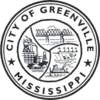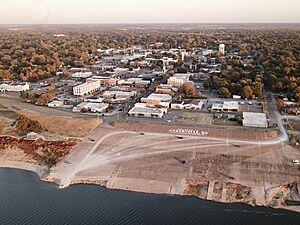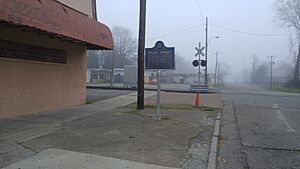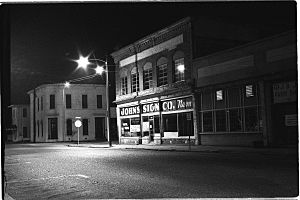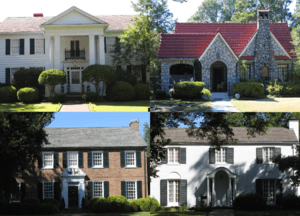Greenville, Mississippi facts for kids
Quick facts for kids
Greenville, Mississippi
|
|||
|---|---|---|---|
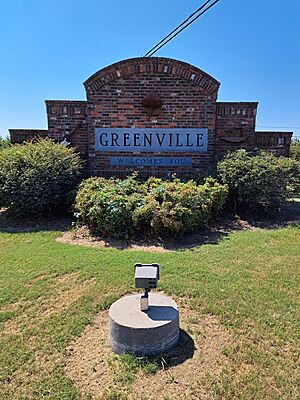 |
|||
|
|||
| Nickname(s):
The Heart & Soul of the Delta
|
|||
| Motto(s):
The Best Food, Shopping, & Entertainment in the South
|
|||
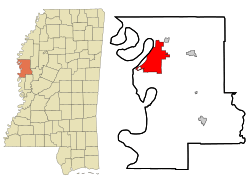
Location of Greenville in Washington County
|
|||
| Country | United States | ||
| State | Mississippi | ||
| County | Washington | ||
| Incorporated | June 24, 1870 | ||
| Government | |||
| • Type | Municipal government | ||
| Area | |||
| • City | 27.67 sq mi (71.66 km2) | ||
| • Land | 26.89 sq mi (69.66 km2) | ||
| • Water | 0.77 sq mi (2.00 km2) | ||
| Elevation | 125 ft (38 m) | ||
| Population
(2020)
|
|||
| • City | 29,670 | ||
| • Density | 1,103.18/sq mi (425.95/km2) | ||
| • Urban | 38,300 | ||
| Time zone | UTC−6 (CST) | ||
| • Summer (DST) | UTC−5 (CDT) | ||
| ZIP codes |
38701–38704, 38731
|
||
| Area code(s) | 662 | ||
| FIPS code | 28-29180 | ||
| GNIS feature ID | 2403752 | ||
| Website | www.greenvillems.org | ||
Greenville is a city in the state of Mississippi in the United States. It is the ninth-largest city in Mississippi by population. Greenville is also the biggest city in the Mississippi Delta region. It is the main city, or county seat, of Washington County. In 2020, about 29,670 people lived there.
Contents
A Look at Greenville's Past
How Greenville Began
For thousands of years, different groups of indigenous peoples lived in this area. When French explorers arrived, they met the Natchez people. The French set up a settlement nearby in what they called La Louisiane.
The city of Greenville you see today is actually the third city in Mississippi with this name. The first Greenville was near Natchez and was important from 1803 to 1825. It disappeared after the American Revolution.
Later, many people moved to the area where the second Greenville would be. They came from eastern states looking for land to grow cotton. This area became a busy trading spot for cotton farms. In 1830, the U.S. government passed a law called the Indian Removal Act. This law forced many Native American tribes to move west of the Mississippi River.
In 1844, the county seat of Washington County needed to move. The second Greenville was chosen as the new county seat and was officially founded in 1847. A man named William W. Blanton bought the land that is now downtown Greenville. The city was named after General Nathanael Greene, a friend of President George Washington. This second Greenville grew quickly because of the profitable cotton plantations. Many people, including enslaved African people, were forced to work on these large farms.
The two earlier county seats, New Mexico and Princeton, were washed away by the Mississippi River. As the county seat, Greenville became the main place for trade, business, and culture for the big cotton plantations around it.
Greenville During the Civil War
The second Greenville was destroyed during the American Civil War. This happened when the Union Army was fighting near Vicksburg. Union soldiers landed in Greenville. Because they were shot at, they burned almost every building in the town. People living there had to find safety in nearby farmhouses. After the war ended, soldiers from Mississippi came back to find Greenville in ruins.
The people decided to rebuild their city. They chose a new spot, which is where the current Greenville (the third) stands today. This new spot was three miles away and was the highest point on the Mississippi River between Vicksburg and Memphis. Much of this land belonged to Mrs. Harriet Blanton Theobald. She was happy about the idea of a new Greenville and even gave land for schools, churches, and public buildings. She became known as the "Mother of Greenville". A man named Major Richard O’Hea helped plan the layout of the new town.
Greenville became successful again, still relying on cotton. In the early 1900s, important families from Greenville had a lot of power in the state. Many old homes and buildings from the late 1800s and early 1900s are now listed as historic places. Greenville was a key center for the Delta's culture in the early 20th century.
Nelson Street and the Blues
African Americans in the Delta created amazing new kinds of music. Nelson Street was a famous area with many blues clubs in the 1940s and 1950s. People would gather there to listen to Delta blues, big band music, jump blues, and jazz. Record companies even came to Greenville to find new musicians. Nelson Street was similar to Beale Street in Memphis.
Today, the Mississippi Blues Commission helps remember this important music. They have marked many places in the Delta as part of the Mississippi Blues Trail. Southern Whispers Restaurant on Nelson Street was one of the first places marked. It was a popular stop for blues musicians in the early days. The sign outside the restaurant tells about its role in blues history.
Greenville Today
In 2020, the city asked churches to close to help stop the spread of COVID-19. Some churches were fined for holding drive-in gatherings. The U.S. Justice Department stepped in to support the churches.
Greenville's Location and Climate
Greenville is located on the east side of Lake Ferguson. This lake is an "oxbow lake," which means it was once a bend in the Mississippi River that got cut off.
There are two floating casinos on the lake: Trop Casino Greenville and Harlow's Casino Resort. A lumber mill used to operate on the lake, making hardwood boxes.
The city covers about 27.7 square miles (71.7 square kilometers). Most of this area is land, with a small part being water.
Weather in Greenville
| Climate data for Greenville, Mississippi, Greenville Mid-Delta Airport, 1991–2020, extremes 1903–present | |||||||||||||
|---|---|---|---|---|---|---|---|---|---|---|---|---|---|
| Month | Jan | Feb | Mar | Apr | May | Jun | Jul | Aug | Sep | Oct | Nov | Dec | Year |
| Record high °F (°C) | 90 (32) |
91 (33) |
91 (33) |
96 (36) |
100 (38) |
107 (42) |
110 (43) |
107 (42) |
107 (42) |
99 (37) |
88 (31) |
85 (29) |
110 (43) |
| Mean daily maximum °F (°C) | 53.0 (11.7) |
57.9 (14.4) |
66.0 (18.9) |
74.5 (23.6) |
82.7 (28.2) |
89.4 (31.9) |
92.5 (33.6) |
92.3 (33.5) |
88.0 (31.1) |
77.2 (25.1) |
64.7 (18.2) |
55.2 (12.9) |
74.5 (23.6) |
| Daily mean °F (°C) | 44.1 (6.7) |
47.9 (8.8) |
55.6 (13.1) |
64.0 (17.8) |
72.5 (22.5) |
79.4 (26.3) |
82.4 (28.0) |
81.6 (27.6) |
76.0 (24.4) |
65.1 (18.4) |
53.5 (11.9) |
46.2 (7.9) |
64.0 (17.8) |
| Mean daily minimum °F (°C) | 35.1 (1.7) |
37.9 (3.3) |
45.2 (7.3) |
53.5 (11.9) |
62.4 (16.9) |
69.3 (20.7) |
72.4 (22.4) |
70.9 (21.6) |
64.0 (17.8) |
53.0 (11.7) |
42.4 (5.8) |
37.1 (2.8) |
53.6 (12.0) |
| Record low °F (°C) | −1 (−18) |
−2 (−19) |
15 (−9) |
29 (−2) |
36 (2) |
49 (9) |
53 (12) |
50 (10) |
37 (3) |
25 (−4) |
16 (−9) |
−1 (−18) |
−2 (−19) |
| Average precipitation inches (mm) | 4.49 (114) |
4.72 (120) |
4.71 (120) |
5.01 (127) |
3.79 (96) |
3.32 (84) |
3.18 (81) |
2.83 (72) |
3.62 (92) |
4.22 (107) |
4.01 (102) |
5.10 (130) |
49.00 (1,245) |
| Average precipitation days (≥ 0.01 in) | 9.2 | 10.5 | 10.4 | 8.5 | 9.5 | 7.5 | 8.6 | 7.5 | 7.0 | 8.2 | 8.0 | 9.4 | 104.3 |
| Source: NOAA | |||||||||||||
People of Greenville
| Historical population | |||
|---|---|---|---|
| Census | Pop. | %± | |
| 1860 | 760 | — | |
| 1870 | 890 | 17.1% | |
| 1880 | 2,191 | 146.2% | |
| 1890 | 6,658 | 203.9% | |
| 1900 | 7,642 | 14.8% | |
| 1910 | 9,610 | 25.8% | |
| 1920 | 11,560 | 20.3% | |
| 1930 | 14,807 | 28.1% | |
| 1940 | 20,892 | 41.1% | |
| 1950 | 29,936 | 43.3% | |
| 1960 | 41,502 | 38.6% | |
| 1970 | 39,648 | −4.5% | |
| 1980 | 40,613 | 2.4% | |
| 1990 | 45,226 | 11.4% | |
| 2000 | 41,633 | −7.9% | |
| 2010 | 34,400 | −17.4% | |
| 2020 | 29,670 | −13.7% | |
| 2023 (est.) | 27,644 | −19.6% | |
| Sources: U.S. Decennial Census |
|||
Population in 2020
| Race | Num. | Perc. |
|---|---|---|
| White | 4,821 | 16.25% |
| Black or African American | 23,787 | 80.17% |
| Native American | 33 | 0.11% |
| Asian | 264 | 0.89% |
| Pacific Islander | 3 | 0.01% |
| Other/Mixed | 493 | 1.66% |
| Hispanic or Latino | 269 | 0.91% |
In 2020, the city of Greenville had 29,670 people. There were 12,142 households and 7,405 families living in the city.
Getting Around Greenville
Air Travel
The Greenville Mid Delta Regional Airport serves Greenville and the surrounding area. You can find it northeast of downtown Greenville. It offers flights to Dallas/Fort Worth (DFW) and Nashville (BNA) with Contour Airlines.
Roads and Highways
Major roads in the Greenville area include U.S. Highway 61, U.S. Highway 82, and the Great River Road (Mississippi Highway 1). U.S. Highway 82 is very important for the Mississippi Delta. It connects to Interstate 55 and other big four-lane highways.
A new bypass for U.S. Highway 82 is being built. It will connect to the new Greenville Bridge and end near Leland. The Greenville Bridge is a large, four-lane bridge that crosses the Mississippi River into Arkansas. It opened in 2010 and cost $206 million. It replaced an older, two-lane bridge.
Train Lines
The Columbus and Greenville Railway moves freight (goods) by train between Greenwood and Greenville. North of Greenville, the Great River Railroad has a line that goes to Rosedale.
Greenville's Economy
Around 2008, there were ten grocery stores in Greenville run by people of Chinese descent. In 1951, there were 42 such stores, but many Chinese families have since moved away from the Delta region.
Schools and Learning
Most of Greenville is served by the Greenville Public School District. A small part of the city is in the Western Line School District. Students in the Greenville district go to Greenville High School. Those in the Western Line district attend O'Bannon High School.
There are also private schools in Greenville. These include Washington School, Greenville Christian School, and St. Joseph Catholic School (which teaches students from kindergarten to 12th grade). St. Joseph is a Catholic school.
The Greenville Higher Education Center offers classes for adults. You can take community courses or earn college credits from Delta State University, Mississippi Delta Community College (MDCC), and Mississippi Valley State University. All of Washington County is served by MDCC.
Local News
The daily newspaper in Greenville is called Delta Democrat Times.
Sports Teams
Greenville has been home to a few sports teams:
- The Greenville Bucks were a minor-league baseball team from 1922 to 1955.
- The Greenville Bluesmen were an independent minor league baseball team from 1996 to 2001.
- The Mississippi Miracles (formerly the Mississippi Stingers) were a professional basketball team from 2004 to 2006.
Interesting Places to Visit
The Winterville Mounds Historic Site is located north of Greenville. It has more than twelve large earth mounds. These mounds were built by people of the Plaquemine Mississippian culture between the 13th and 15th centuries. This was long before Europeans explored the area. These mound-building cultures were very important along the Mississippi River. The historic Natchez people are thought to be the only group from this culture still around when Europeans arrived.
The Winterville Mounds are now a state park and a National Historic Landmark. There is a museum at the site that shows artifacts found during digs. The park also has walking trails. It is about 3 miles north of Greenville, at 2415 Highway 1 N.
Famous People From Greenville
Born in Greenville
- Steve Azar, a country music singer
- Eden Brent, a blues musician
- Vivian Brown, a meteorologist for The Weather Channel
- Tommy Davidson, an actor and comedian
- Tyrone Davis, a blues musician
- Shelby Foote, an author and historian
- Jimmie Giles, a former NFL tight end
- Jim Henson, the creator of The Muppets
- Corey Holmes, a Canadian Football League player and mayor of Metcalfe, Mississippi
- Lucy Somerville Howorth, a lawyer and women's rights supporter
- Germany Kent, a model and media personality
- Wilbert Montgomery, a former NFL running back
- The Percy family, including Senator Le Roy Percy and author William Alexander Percy. The writer Walker Percy was also raised here.
- Julia Evans Reed, an author and journalist
- George Scott, a former MLB baseball player
- Nellie Nugent Somerville, the first woman elected to the Mississippi Legislature
- LaToya Thomas, a former professional basketball player
- Heather McTeer Toney, a former mayor of Greenville
- Walter Turnbull, an African American musician who founded the Boys Choir of Harlem
- Mary Wilson, a singer from The Supremes
People Connected to Greenville
- Ray Brown, an NFL football player
- Hodding Carter, a Pulitzer Prize-winning journalist who ran the city's newspaper, Delta Democrat Times.
- Hodding Carter III, also a journalist, lived and worked here during the civil rights movement.
- Holt Collier, an African-American bear hunter, is buried in Greenville.
Cities Greenville is Friends With
Greenville has "sister cities" in other countries:
See also
 In Spanish: Greenville (Misisipi) para niños
In Spanish: Greenville (Misisipi) para niños
 | Valerie Thomas |
 | Frederick McKinley Jones |
 | George Edward Alcorn Jr. |
 | Thomas Mensah |



